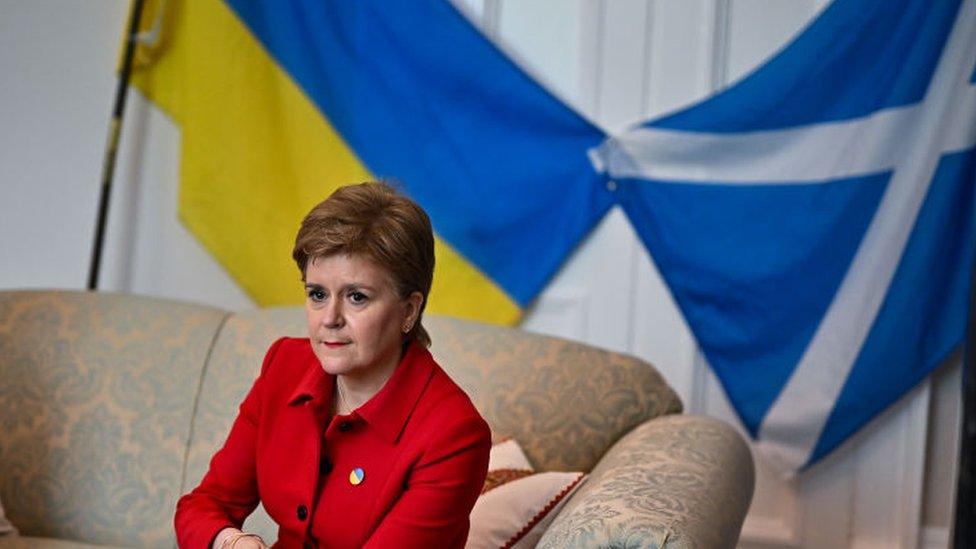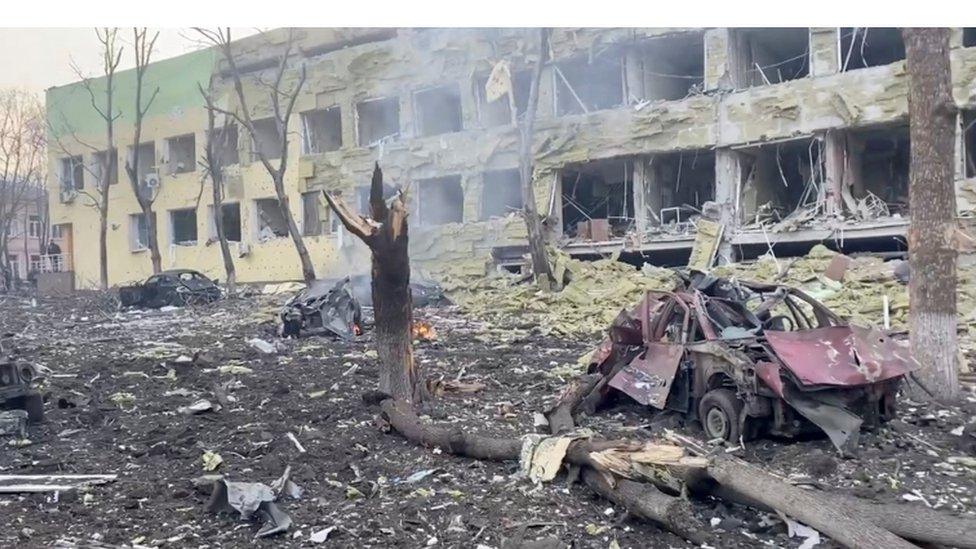North Sea oil not solution to Russian reliance - Nicola Sturgeon
- Published
Nicola Sturgeon said it could take years for new oil and gas developments to bear fruit
Ramping up North Sea oil and gas is not a short-term solution to Europe's reliance on Russian supplies, First Minister Nicola Sturgeon has said.
The UK and US are banning the import of Russian oil, while the EU is stripping back its use of gas from the country in response to the invasion of Ukraine.
The Scottish Conservatives argue that increasing North Sea production could help reduce dependence on Russia.
But Ms Sturgeon said it would take years to open up new oil or gas fields.
She said the best move was to "accelerate the transition away from fossil fuels" - and called on the UK government to act to shield households from energy price rises in the meantime.
Prime Minister Boris Johnson has promised to set out a new energy supply strategy, with speculation this may involve more use of domestic energy resources.
There are questions about how this would hit the UK's climate change goals, but Mr Johnson said "the reality is there is a crunch on at the moment".
At Holyrood, Scottish Tory leader Douglas Ross said production from the likes of the mothballed Cambo oil field off Shetland could "help reduce Europe's dependence on Russian oil and gas".
While he acknowledged climate targets, he said "Russia's war has changed the situation and we need to accept that".
He added: "Scotland could strike a blow to Vladimir Putin by increasing domestic oil and gas production. We could increase that production now, we could end the need to import foreign gas and export more to reduce foreign reliance on Russia.
"It's time to be practical and realistic."

Nicola Sturgeon said it could take years for new oil and gas developments to bear fruit
Ms Sturgeon said that Scotland was not dependent on Russian supplies in the same way other European countries were, but said "we will all bear the burden of increased prices" for energy and food.
However she insisted that it was not credible to suggest that the North Sea could provide an immediate solution to the crisis, with existing fields not operating under capacity.
The first minister also dismissed the idea of commissioning new nuclear power plants to bolster the UK's energy mix.
She said: "We don't do anybody any favours if we put forward solutions that don't provide a panacea in the short term.
"If we were to give the go-ahead to Cambo for example right now, 2026 would be the earliest it could start producing oil.
"With new nuclear, if we were to give the go-ahead today it would be years if not decades before that came on stream."
'Financial intervention'
Ms Sturgeon also called on the UK government to step in to help people struggling with fuel, gas and food bills.
She said: "It is inescapably the case that we need to see a substantial financial intervention from the Chancellor to shield households across the country from the impact of rising inflation."
Industry groups called for ministers to find consensus about the future, with Offshore Energies UK saying oil and gas would still be needed in the short term.
Chief executive Deirdre Michie said investment in the North Sea was required as part of a "fair and managed transition" away from fossil fuels, if the UK is to avoid increasing reliance on imports.

Russian forces shelled a maternity and children's hospital in Mariupol on Wednesday
The exchanges at First Minister's Questions also saw Ms Sturgeon accuse Russian President Vladimir Putin of committing war crimes in Ukraine.
A Russian air strike on a maternity and children's hospital in the city of Mariupol on Wednesday killed three people - including a child - and injured 17 others.
Ms Sturgeon said she was "horrified and deeply distressed" by the scenes, which she said marked a "new low" in the Russian invasion.
She added: "Vladimir Putin is committing, on a daily basis, crimes against international law, he is committing crimes against humanity, he is committing war crimes.
"It is important to do everything that is possible to stop Vladimir Putin, but it is also important to ensure that he pays the severest price for the actions that he is undertaking and the crimes he is committing now."
Ms Sturgeon's comments were echoed by other party leaders, with Scottish Conservative leader Douglas Ross accusing the Russians of targeting children, while his Labour counterpart Anas Sarwar said Mr Putin "must fail" and "must face justice".
They were speaking just hours after the UK government announced plans to liberalise the visa process for people fleeing Ukraine who seek to come to the UK.
However, the three party leaders agreed that the changes, which would allow for applications to be made online and supplementary paperwork and biometric checks undertaken when they reach Britain, did not go far enough.